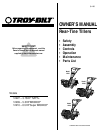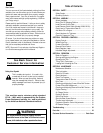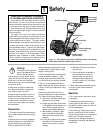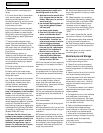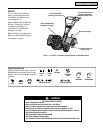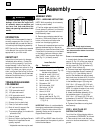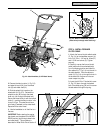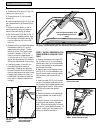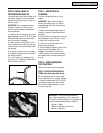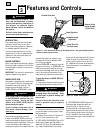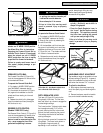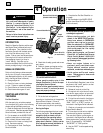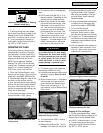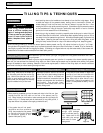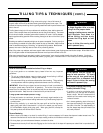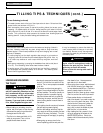
4 Section 1: Safety
4. Exercise caution to avoid slipping or
falling.
5. If the unit should start to vibrate abnor-
mally, stop the engine, disconnect the
spark plug wire and prevent it from
touching the spark plug, and check imme-
diately for the cause. Vibration is gener-
ally a warning of trouble.
6. Stop the engine, disconnect the spark
plug wire and prevent it from touching the
spark plug, whenever you leave the oper-
ating position, before unclogging the tines,
or when making any repairs, adjustments
or inspections.
7. Take all possible precautions when
leaving the machine unattended. Stop the
engine. Disconnect the spark plug wire
and move it away from the spark plug. Be
sure that both wheels are in the Wheel
Drive position.
8. Before cleaning, repairing, or
inspecting, stop the engine and make cer-
tain all moving parts have stopped. Dis-
connect the spark plug wire and prevent it
from touching the spark plug to prevent
accidental starting.
9. The flap on the tine hood must be down
when operating the tiller.
10. Never use the tiller unless proper
guards, plates, or other safety protective
devices are in place.
11. Do not run the engine in an enclosed
area. Engine exhaust contains carbon
monoxide gas, a deadly poison that is
odorless, colorless, and tasteless.
12. Keep children and pets away.
13. Never operate the tiller under engine
power if the wheels are in the Freewheel
position. In the Freewheel position, the
wheels will not hold the tiller back and the
revolving tines could propel the tiller
rapidly, possibly causing loss of control.
Always engage the wheels with the wheel
drive pins in the Wheel Drive position
before starting the engine or engaging the
tines/wheels with the Forward Clutch Bail
(all models) or the Reverse Clutch control
(Models 12209/12210 only).
14. Be aware that the tiller may unex-
pectedly bounce upward or jump forward
if the tines should strike extremely hard
packed soil, frozen ground, or buried
obstacles like large stones, roots, or
stumps. If in doubt about the tilling con-
ditions, always use the following
operating precautions to assist you in
maintaining control of the tiller:
a. Walk behind and to one side of the
tiller, using one hand on the han-
dlebars. Relax your arm, but use a
secure hand grip.
b. Use shallower depth regulator set-
tings, working gradually deeper
with each pass.
c. Use slower engine speeds.
d. Clear the tilling area of all large
stones, roots and other debris.
e. Avoid using downward pressure on
the handlebars. If need be, use
slight upward pressure to keep the
tines from digging too deeply.
f. Before contacting hard packed soil
at the end of a row, reduce engine
speed and lift the handlebars to
raise the tines out of the soil.
g. In an emergency, stop the tines and
wheels by releasing whichever
clutch control is engaged. Do not
attempt to restrain the tiller.
15. Do not overload the tiller’s capacity by
attempting to till too deeply at too fast a
rate.
16. Never operate the tiller at high trans-
port speeds on hard or slippery surfaces.
Look behind and use care when backing
up.
17. Do not operate the tiller on a slope
that is too steep for safety. When on
slopes, slow down and make sure you
have good footing. Never permit the tiller
to freewheel down slopes.
18. Never allow bystanders near the unit.
19. Only use attachments and accessories
that are approved by the manufacturer of
the tiller.
20. Use tiller attachments and accessories
when recommended.
21. Never operate the tiller without good
visibility or light.
22. Never operate the tiller if you are tired;
or under the influence of alcohol, drugs or
medication.
23. Operators shall not tamper with the
engine-governor settings on the machine;
the governor controls the maximum safe
operating speed to protect the engine and
all moving parts from damage caused by
overspeed. Authorized service shall be
sought if a problem exists.
24. Do not touch engine parts which may
be hot from operation. Let parts cool down
sufficiently.
25. Please remember: You can always
stop the tines and wheels by releasing the
Forward Clutch Bail or on Models 12209
and 12210 the Reverse Clutch control,
(whichever control is engaged), or by
moving the ignition switch and/or throttle
control lever on the engine to “OFF” or
“STOP”.
26. To load or unload the tiller, see the
instructions in Section 4 of this Manual.
27. Use extreme caution when reversing
or pulling the machine towards you.
28. Start the engine carefully according to
instructions and with feet well away from
the tines.
29. Never pick up or carry a machine
while the engine is running.
Maintenance and Storage
1. Keep the tiller, attachments and acces-
sories in safe working condition.
2. Check all nuts, bolts, and screws at
frequent intervals for proper tightness to
be sure the equipment is in safe working
condition.
3. Never store the tiller with fuel in the fuel
tank inside a building where ignition
sources are present such as hot water and
space heaters, furnaces, clothes dryers,
stoves, electric motors, etc.). Allow the
engine to cool before storing the unit in
any enclosure.
4. To reduce the chances of a fire hazard,
keep the engine free of grass, leaves, or
excessive grease.
5. Store gasoline in a cool, well-ventilated
area, safely away from any spark- or
flame-producing equipment. Store gaso-
line in an approved container, safely away
from the reach of children.
6. Refer to the Maintenance sections of
this Manual and the separate Engine
Owner’s Manual for instructions if the unit
is to be stored for an extended period.
7. Never perform maintenance while the
engine is running or the spark plug wire is
connected, except when specifically
instructed to do so.
8. If the fuel tank has to be drained, do
this outdoors.



